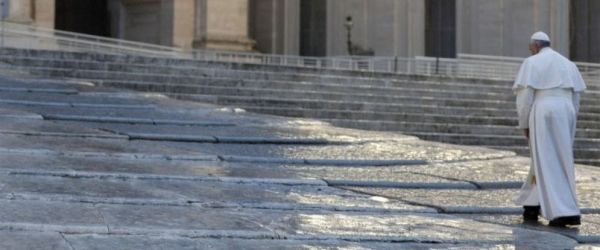Today’s liturgy tells the episode of the storm calmed by Jesus (Mk 4:35-41). The boat in which the disciples are crossing the lake is beaten by the wind and the waves and they fear they will sink. Jesus is with them on the boat, yet he is in the stern asleep on the cushion. Filled with fear, the disciples cry out to him: “Teacher, do you not care if we perish?” (v. 38).
And quite often we too, beaten by the trials of life, have cried out to the Lord: “Why do you remain silent and do nothing for me?”. Especially when it seems we are sinking, because love or the project in which we had laid great hopes disappears; or when we are at the mercy of unrelenting waves of anxiety; or when we feel we are drowning in problems or lost amid the sea of life, with no course and no harbour. Or even, in moments in which the strength to go forward fails us, because we have no job, or an unexpected diagnosis makes us fear for our health or that of a loved one. There are many moments when we feel we are in a storm; when we feel we are almost done in.
In these situations and in many others, we too feel suffocated by fear and, like the disciples, risk losing sight of the most important thing. In the boat, in fact, even if he is sleeping, Jesus is there, and he shares with his own all that is happening. If on the one hand his slumber surprises us, on the other, it puts us to the test. The Lord is there, present; indeed, he waits — so to speak — for us to engage him, to invoke him, to put him at the centre of what we are experiencing. His slumber causes us to wake up. Because to be disciples of Jesus, it is not enough to believe God is there, that he exists, but we must put ourselves out there with him; we must also raise our voice with him. Hear this: we must cry out to him. Prayer is often a cry: “Lord, save me!”. I was watching, on the programme “In his Image”, today, the Day of Refugees, many who come in large boats and at the moment of drowning cry out: “Save us!”. In our life too the same thing happens: “Lord, save us!”, and prayer becomes a cry.
Today we can ask ourselves: what are the winds that beat against my life? What are the waves that hinder my navigation, and put my spiritual life, my family life, even my psychological life in danger? Let us say all this to Jesus; let us tell him everything. He wants this; he wants us to grab hold of him to find shelter from the unexpected waves in life. The Gospel recounts that the disciples approach Jesus, wake him and speak to him (cf. v. 38). This is the beginning of our faith: to recognize that alone we are unable to stay afloat; that we need Jesus like sailors need the stars to find their course. Faith begins from believing that we are not enough for ourselves, from feeling in need of God. When we overcome the temptation to close ourselves off, when we overcome the false religiosity that does not want to disturb God, when we cry out to him, he can work wonders in us. It is the gentle and extraordinary power of prayer, which works miracles.
Jesus, begged by the disciples, calms the wind and waves. And he asks them a question, a question which also pertains to us: “Why are you afraid? Have you no faith?” (v. 40). The disciples were gripped with fear, because they were focused on the waves more than on looking at Jesus. And fear leads us to look at the difficulties, the awful problems, and not to look at the Lord, who many times is sleeping. It is this way for us too: how often we remain fixated on problems rather than going to the Lord and casting our concerns to him! How often we leave the Lord in a corner, at the bottom of the boat of life, to wake him only in a moment of need! Today, let us ask for the grace of a faith that never tires of seeking the Lord, of knocking at the door of his Heart. May the Virgin Mary, who in her life never stopped trusting in God, reawaken in us the basic need of entrusting ourselves to him each day.
[Pope Francis, Angelus 20 June 2021]












